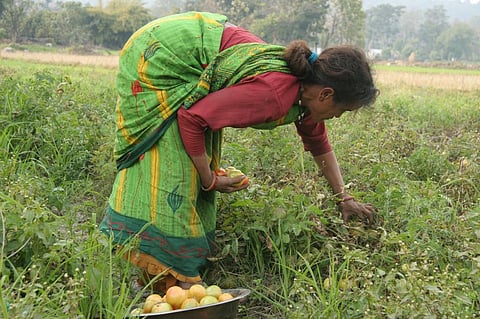The ABCDs of extreme profits by agri-corporations
A farmer not turning a profit doesn’t make news. That is why when tomato prices reached an all-time high in India, there were headlines about a few farmers earning their lifetime profits from an agricultural product. Soon after, the price plummeted and farmers were seen dumping hundreds of tonnes of tomatoes in the streets.
In this period of high volatility in food prices, one often wonders who makes the profit or who bears the loss. During the period of high tomato rates, most farmers did not earn enough to be taken note of. But consumers paid heavily for the commodity. The question is: Where did the profits go?
This question becomes a multi-billion dollar one when one considers the global agri-economy.
Several reports have found that since 2014, climatic events have made crop production uncertain and resulted in periods of high food inflation, implying that markets have become highly volatile. While farmers suffer losses in such situations, the question is whether those involved in agriculture businesses face losses as well.
The United Nations Trade and Development Report 2023 has answered this question. The report revealed the massive profit made by global food traders from this situation, which poses an existential threat not only to producers but also to consumers — high food inflation has left millions food insecure.
The volatility in the prices of food commodities in the last few years have coincided with global food traders reporting record profits, the analysis in the report found.
According to the report, the four companies that control nearly 70 per cent of the global food market – also called ABCD, representing the initials of the four biggest commodity traders — Archer Daniels Midland, Bunge, Cargill and Louis Dreyfus Company — share recorded highest ever profits in 2021-2022.
The report has quoted data from a study by non-profit Oxfam that said, “18 food and beverage corporations made on average about $14 billion a year in windfall profits in 2021 and 2022.” To make sense of this, the corporations’ profit was more than double of the funding gap for delivering life-saving food assistance in East Africa. Similarly, profiteering accounted for 20 per cent of food inflation in Europe.
The UN’s latest report has attributed this “profiteering” by a few corporations to “systemic crises” that have gripped the world food system. “Growing cross-sectoral control over the food system by major agri-corporations raises the risk that extreme food price swings will become the norm,” said the report.
“Through decades of mergers and acquisitions, such firms have been able to expand their influence up and down the supply chain, while amassing huge amounts of market data,” the report added.
These companies are now financiers, trade influencers, and price setters for agricultural commodities, to the point where they assist governments in hedging volatility in commodity markets. In one sense, they are the absolute rulers of agribusiness, seeking only to profit from crisis situations.
Since the Russia-Ukraine war, global food prices have spiked to record levels. The latest report attributes the spike to a significant level without the systemic profiteering by the big agri-corporations.
“…ABCD-type companies have come to occupy a privileged position in terms of setting prices, accessing funding, and participating directly in the financial markets. This not only enables speculative trades in organised market platforms, but a growing volume of transactions between individuals, or over-the-counter trades, over which most governments in the advanced countries have no authority or control,” said the report.
The report quoted a reply from a former senior economist with Food and Agriculture Organization to the question of who monitors the food system: “Nobody”.
With over 100 million more people becoming food insecure due to price rises, it is time to put somebody in charge of monitoring the global food system, which has come under scrutiny like never before.


